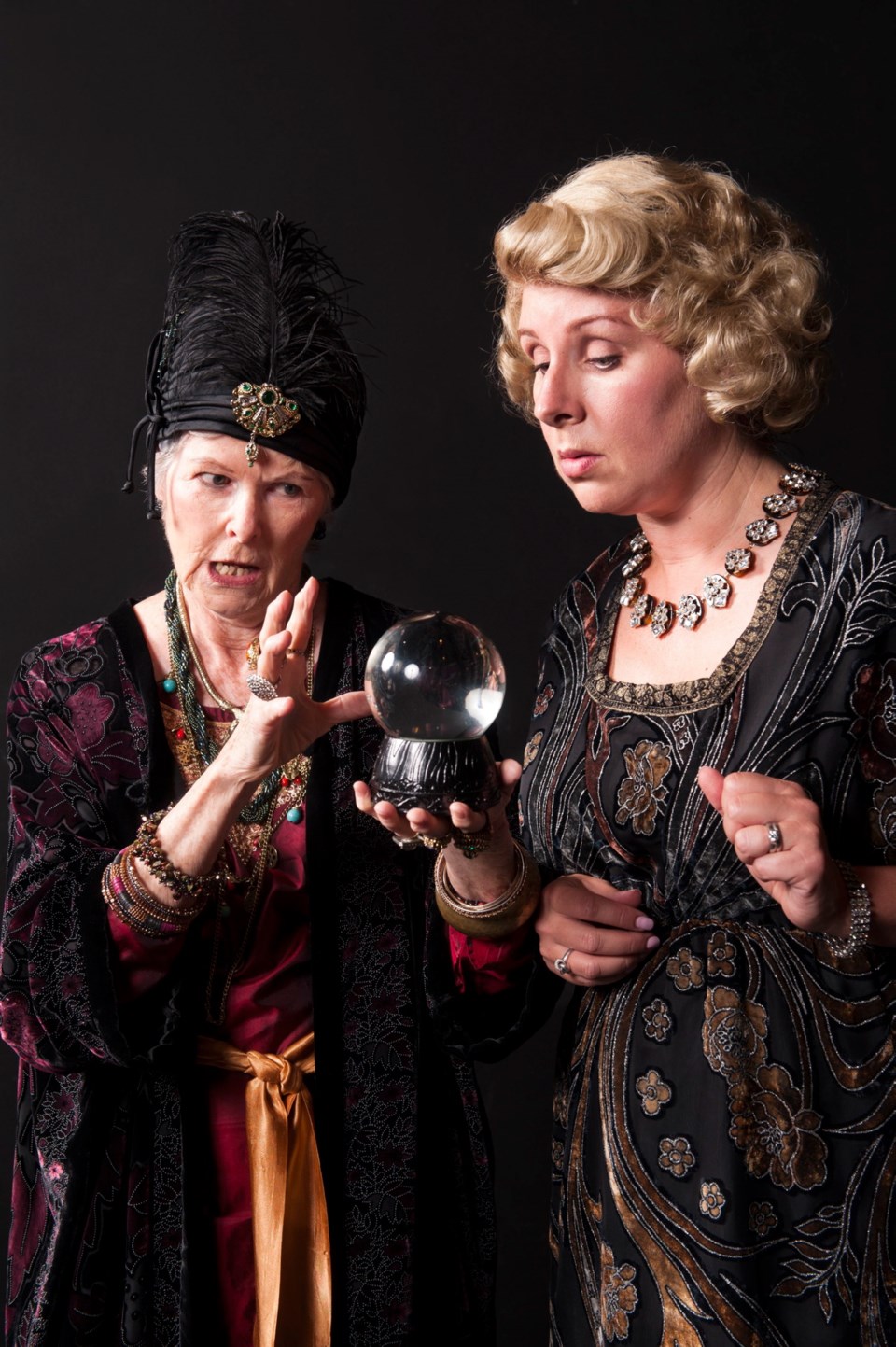Community theatre groups love to stage plays by Noël Coward — and it’s easy to see why. The British playwright’s comedies are familiar to audiences. And Coward’s breezy, tart, sophisticated wit — at its best, equal to that of Oscar Wilde — never goes out of style.
At the same time, these plays are difficult to do well. The pacing must be fleet-footed; the repartee must sparkle like newly popped Dom Perignon. This is a tall order, even for professional companies. And so we, the audience, are presented with productions offering varying degrees of effervesce.
Langham Court Theatre has launched its 90th season with a credible interpretation of Blithe Spirit, one of Coward’s most beloved plays (this marks the fifth time the venerable company has staged it). This show is blessed with good actors in lead roles, a terrifically detailed 1930s-style set and special effects that work wonderfully.
It’s true that, at a performance earlier this week, the dialogue didn’t always ping-pong with the helium ease for which one always hopes with Coward. Still, a number of scenes were done well — I suspect devotees will find something to enjoy.
For those who can’t recall, Blithe Spirit is a ghost tale. Written by Coward in 1941 as a sort of relief to the horrors of the Second World War, it’s about an urbane novelist called Charles (Alan Penty) who decides to invite clairvoyant Madame Arcati (Elizabeth Whitmarsh) to a dinner party at his home. Charles is not a believer, he merely believes her antics will provide fodder for his new book.
During the party, Arcati inadvertently summons the ghost of Elvira (Jackie Rioux), Charles’s late wife. This is displeasing to his current wife, Ruth, (Kate McCallum Pagett). Only Charles can see Elvira. At first, Ruth thinks her husband is merely being silly and thoughtless when he chats to his deceased spouse. Then she starts taking him seriously — and the real fun begins.
In Blithe Spirit much of the humour revolves around the old comic device of cross-talk. Charles scolds Elvira, a Puck-like creature, by saying: “Oh be quiet. You’re behaving like a guttersnipe.” Seeing no one else in the room, Ruth believes her husband is chastising her — what ensues is a droll game of Punch and Judy, with sarcasm replacing blows.
As with the martinis Charles constantly quaffs, Coward’s wit is unusually dry by 2018 standards. The characters might seem unsympathetic to some modern theatregoers; the playwright himself admitted: “You can’t sympathize with any of them. If there was a heart in it, it would be a sad story.”
In short, Charles, Elivra and Ruth seem mostly concerned with themselves and how events affect them. With smoking-jacket elegance, Charles alternately strokes his own ego and, when vexed, implies his ex-wife and current wife are harridans. The women bicker not only about Charles but each other. At the play’s end (it’s a lengthy one; two-hours-plus, with intermission) we leave feeling both amused and perhaps relieved to have seen the last of them all.
On Wednesday night, Whitmarsh — sporting a feathered black turban and a thrift’s-shop worth of cheap necklaces — impressed as Arcati. The character is an over-the-top clown, continually exclaiming rapturously, scolding enthusiastically and gobbling cucumber sandwiches. Whitmarsh not only captured this in an appropriately broad performance; she caught the character’s eccentric joie de vivre and inner life.
Also fine was Penty as Charles. A reliable comic actor good at this sort of role, he was well able to convey this button-down character with well-articulated bravado and panache. Rioux also succeeded as Elvira, proving herself especially adept in portraying the ghost’s waif-like elegance and understatedly sharp tongue.
The role of Ruth is much more conventional. She can be spirited, but mostly Ruth is an ordinary wife trying to figure out why her husband is acting strangely. When she discovers his ex-wife’s spirit is a rival for his affections, her jealously is of the garden variety.
Pagett, as Ruth, certainly held up her end of this bargain. Yet in terms of banter, she didn’t always capture the lighter-than-air effect to which Coward always aspires. The final scenes of the performance started to drag. Contributing to the problem here was the odd decision to frequently shut the curtains between scenes. This disrupted the atmosphere (the audience tends to chat at such times) and seemed unnecessary, since no significant changes to the set took place.
Overall, Toshik Bukowiecki’s direction is confident and well thought out. There’s much physical shifting of actors on this play — this was accomplished naturally and deftly. A cornucopia of special effects — there’s ghostly bedlam at the play’s end — was dispatched with professional aplomb.
The set, designed by Bukowiecki, is a sheer delight. It’s an unusually detailed art deco dream worthy of Bertie Wooster, complete with period sconces, fireplace, stained glass and bannisters. This design — and the equally worthy costumes by Wendy Henderson — add immeasurably to the show.
